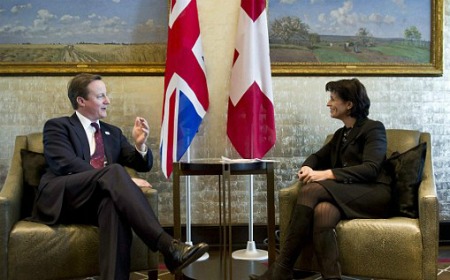The UK's Future in Europe Looks Very Swiss

Despite what the sensational media coverage might suggest, EU-UK relations did not experience a watershed moment last week.
The EU has indeed become a two-tier organization but the divide has not occurred between the UK and Europe but between the Northern “fiscal hawks” and the slump European South, which has dragged the EU into its financial turmoil.
David Cameron’s failure to bring home the concessions he wanted for the UK can be attributed to both bad timing and the tactlessness of the British prime minister. It is understandable that many European heads of state felt irritated when Cameron was putting financial technocratic issues on the agenda while many were consumed with the larger question of how to prevent the collapse of the union.
Cameron can be penalized for misunderstanding the gravity of the summit but not for using the UK's democratic right to withhold a European Union treaty.
Many back in Britannia fear that with the recent fallout that the UK will face a hard time getting any leverage on the EU negotiating table as it lost the few allies it had in continental Europe after this weekend.
However many Euro skeptics in the UK are now looking to Switzerland as a model to emulate. The goal would be to keep the UK and the City of London independent and financially competitive while still reaping the benefits of the common market.
Switzerland has been the elusive poster boy for many Euro skeptics in the past and a closer look shows that while Switzerland remains an EU pariah that it has also undergone closer cooperation with the EU.
Good examples of such behavior is the 2005 incorporation into the Schengen treaty, and the 2007 decision to accept workers from Bulgaria and Romania. Today, Switzerland has amassed around 210 trade treaties with the EU.
The U.K. can be more like Switzerland but it must remember that future EU financial regulations will be decided by majority vote. Hence London has to be aware of the anti-UK sentiments within Brussels. The UK can nevertheless build on the recent summit proceedings from Brussels that have set the EU into the right direction: not that inter-governmental supremacy looks to trump the centralized supranational dictate of Brussels.
Gideon Rachman of the Financial Times makes a very valid point when he suggests that the recent decisions made in Brussels will, “…end up as a footnote in the history books [rather] than a bold new chapter.” Boris Johnson, mayor of the City of London rightfully points out the ridiculous “…epoch-making about David Cameron’s use of the veto – as though some national Excalibur had been finally plucked from the rock..”
There is nothing epochal about David Cameron’s withholding and therefore both sides would be well advised to continue the work on setting up safeguards and mechanisms, which will ensure a sustainable and fiscally responsible European union in the future.

